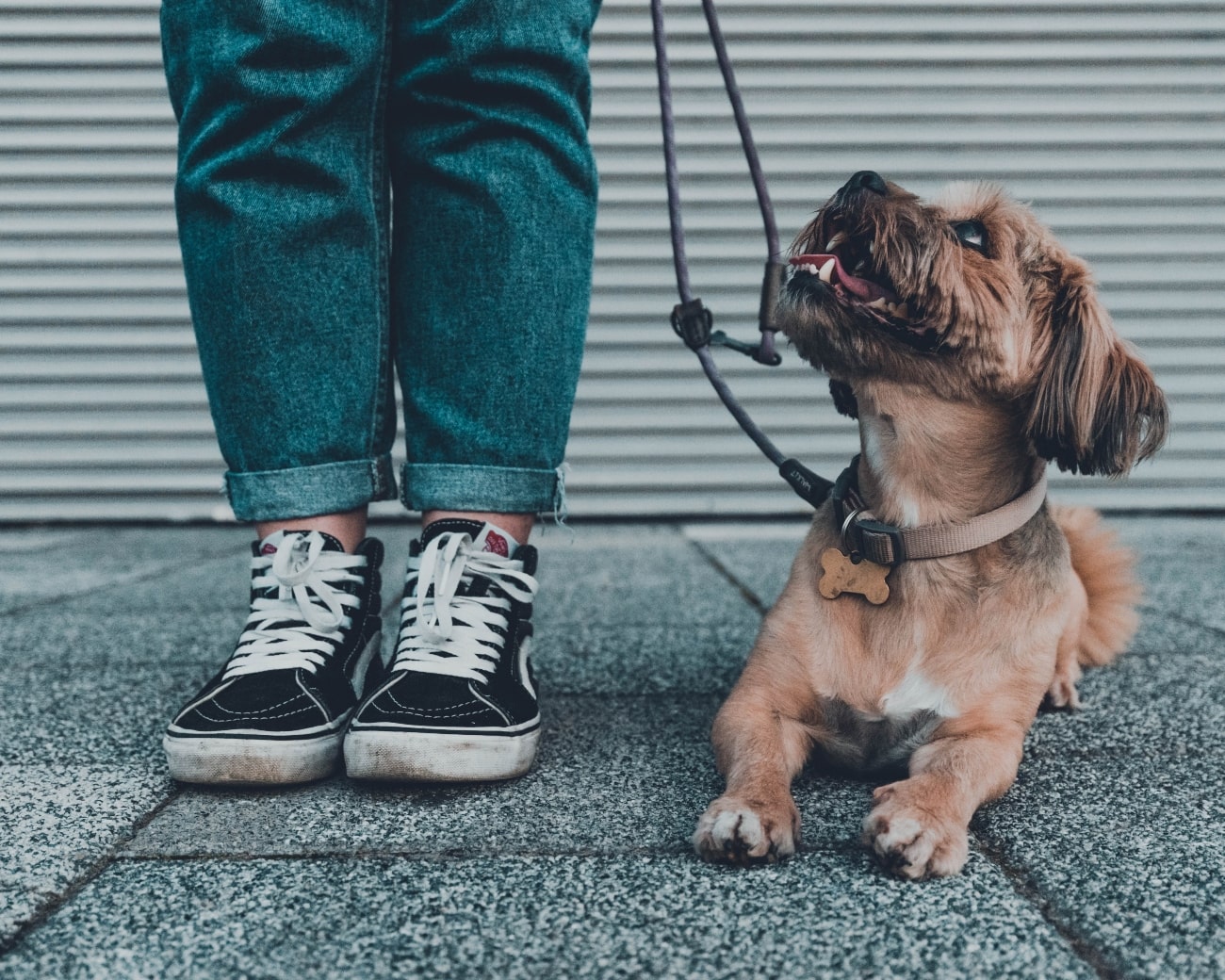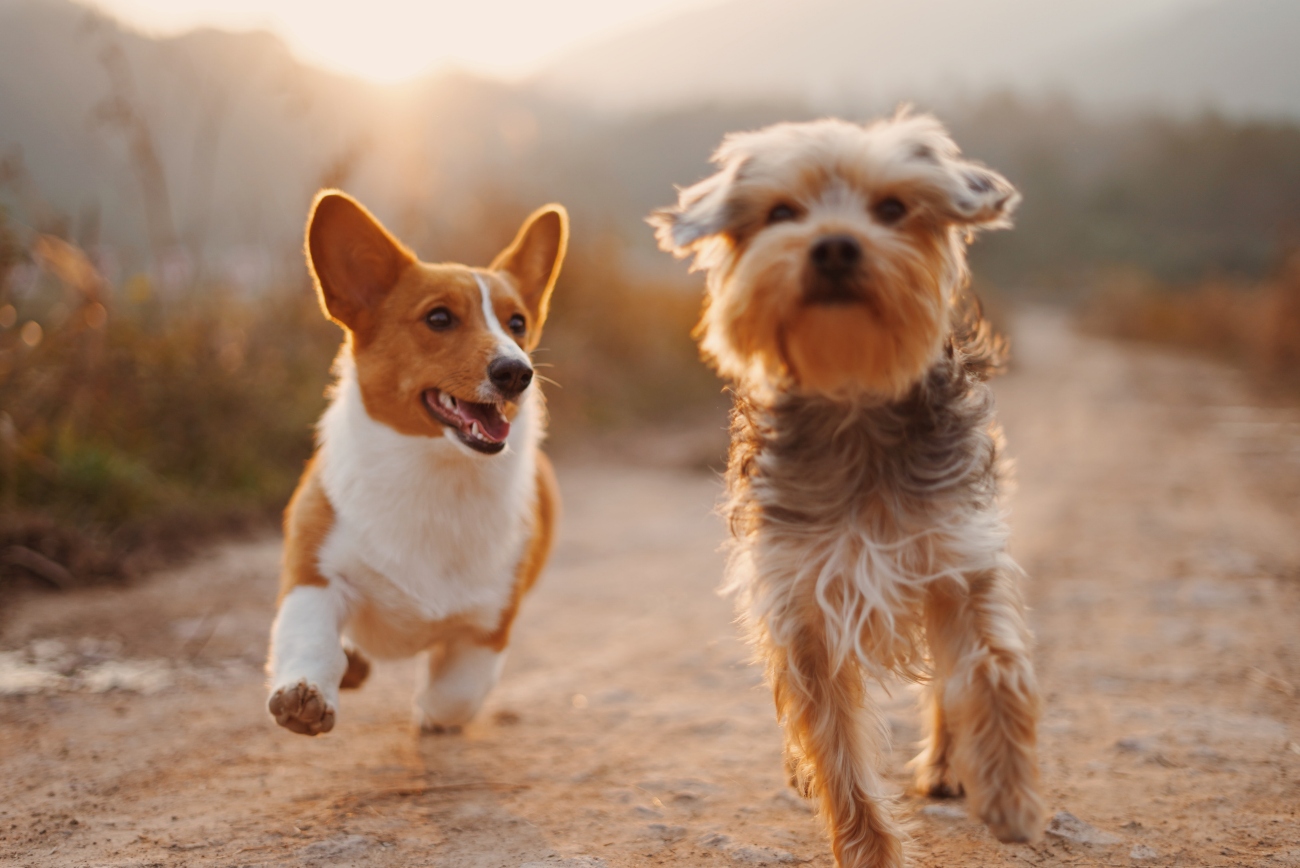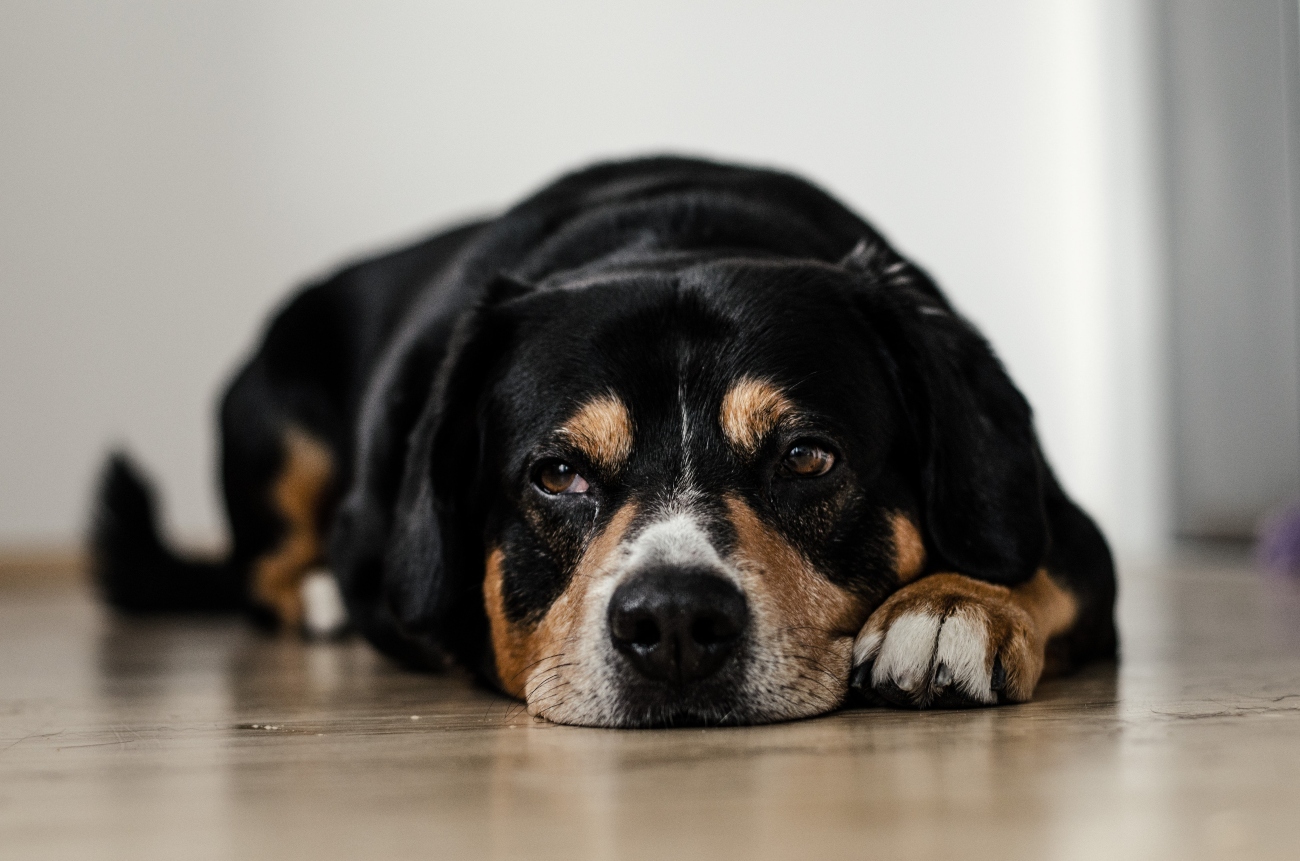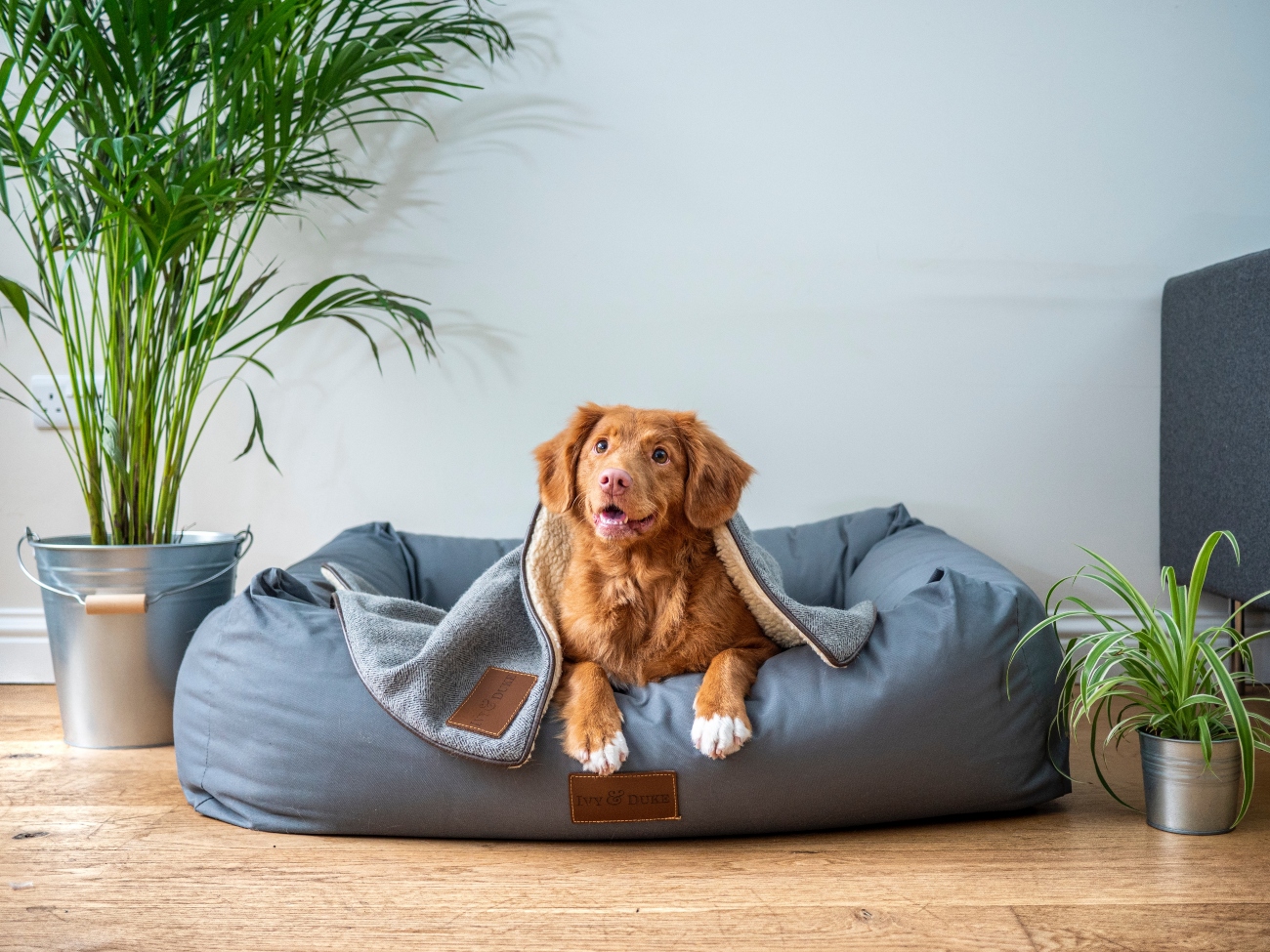
Why does my old dog act like a puppy?
13th April, 2022
We all remember that puppy stage. Chewing, barking, waking us up at night! There's no doubt about it, life with a new pup is a whole lot of fun – and, also, a whole lot of effort.
Now you’re in a completely different phase of life, sharing your home with a much older dog. So why has that puppy behaviour returned?
Most dogs mature somewhere between six and nine months, and then follow all the behaviour training that you've instilled in them throughout most of their adult life. However, some older dogs can actually seem to regress into puppy-like ways during their latter years – forgetting their good toileting manners, barking in their basket, even staying up all night.
What's going on here and what can you do about it? As we'll see, some of these changes may be due to your pup adapting to old age. Others can, at times, be a sign of something more serious. That’s where older dog insurance comes in handy, as it can help you cover the costs of diagnosis and treatment.
What kind of behaviour should I look for?
As the owner of an older dog, you’ll be familiar with the changes in your pet as they age. They’ll start to go grey, their appetite might change and their exercise needs will likely reduce.
They might also start chewing unsuitable items, having toilet accidents and making a fuss at grooming time – behaviour that echoes their most youthful traits, back when they were a pup.
So what behaviours are we talking about? The six most common, puppy-like characteristics that can re-emerge in older dogs are:
- Destructive behaviour
- Toileting indoors
- Waking, and being noisy, at night
- Jumping up during walkies
- Grooming issues
- Not settling in their basket or crate
Sometimes there will be a clear reason for these changes – a new pet being brought into the home, for example. Other times, these new and often unwelcome habits may seem to have arrived completely unprompted. That’s when they might be a sign of old age or a related health condition.
Let's look at these behaviours and discover tips on how to manage them.
1. Destructive behaviour around the home
You'll remember the times when your new puppy liked to rampage around the home, having a chew on anything that looked soft and inviting. It may have been annoying at times, sweet and funny at others.
What you were able to tell yourself, however, was that this was normal puppy behaviour and that they would grow out of it soon enough. When your little one lost their puppy teeth and their adult back molars started to come through, suddenly chewing their way through your household belongings seemed much less of a priority.
What’s happening now? Your beloved little pup, now moving towards the other end of their life, seems to be exhibiting that mad passion for chewing all over again. Why?
Stress and anxiety may be the root causes of this renewed bout of destructive chewing.
Something may be causing your pet added anxiety at this time, and for dogs, chewing is a great way to relieve that stress. So, if your older dog seems to be making a beeline for the soft furnishings, just as they used to as a puppy, why not give them something new to chew on?
A new chew toy might be just the thing they need to calm their anxiety levels without increasing yours. If you can, put a fresh toy their way every few weeks to keep them interested. And when they do chew on the right things, be sure to praise and reward this correct behaviour.
Destructive chewing is more prevalent in certain breeds. These include some very intelligent dogs, as well as those from 'working' breeds. The former class would include the clever Jack Russell, the latter the hardworking Border Collie or Siberian Husky.

What can be the cause of this anxiety?
It could be that something in your dog's lifestyle or external surroundings has changed. For example, building work in the home and familiar areas suddenly changed or out of bounds.
Perhaps you’ve bought another dog or cat? While your older dog may get on well with the new arrival as time goes on, at the beginning they are probably just a rival for your affections.
Another trigger for stress and destructive behaviour in older dogs is a lack of mental and/or physical stimulation. Your pet may not be getting the exercise and excitement they need. This could be for a variety of factors.
Perhaps a change in your own circumstances – a return to the office, for example – means that you don't have the same amount of free time for walkies anymore. Or perhaps you’ve been trying to make allowances for the dog's reduced appetite for exercise, and take them out less – but you may have overcompensated.
Their capabilities may have changed – they may not relish that vigorous three-mile walk any longer – but an older dog's basic need for daily exercise will remain the same.
So make sure that they continue to get plenty of walks, both on and off the lead. Encourage them to explore new routes and chase down interesting scents while out and about. Here are our top tips for walking older dogs. Back at home, give them interactive toys and food puzzles and kongs to keep the brain sharp.
The above examples should be addressed quickly with some simple changes. However, on some occasions, your dog's anxiety may be more intense. These cases may require the help of an animal behaviourist, or possibly some anti-anxiety medication. Both of these treatments will have costs attached, but a good dog insurance policy should be able to help with some of the costs.
2. Toileting indoors
Toilet training. You remember it well - and possibly not for the right reasons! Yes, you probably had to spend a fair amount of time clearing up after your new pup when they were little, until they learned when and where they were supposed to do their business.
This experience may come back around as your dog enters old age. Like some of us humans, dogs can lose control of their bladder and bowels in their later years. This means you may be confronted with some sights (and smells) that you thought you'd consigned to the past. The stress and anxiety that we discussed in the previous point can also be causes for this loss of toileting control.
If your older dog is going to the loo where they shouldn't, it's a good idea to ask your vet to take a look. There may be a health issue requiring further attention – or, less seriously, a problem that can be easily worked out. After all, incontinence in an older dog can be a sign of other underlying conditions like diabetes.
Health conditions that can cause toilet problems
Other health issues that might be coming into play include kidney disease, incontinence, a urinary tract infection, or intestinal parasites. You should be able to rely on your older dog insurance to help with the costs of any consultations and medicines related to these conditions.
Other clues that your dog may have some form of kidney disease or infection include vomiting, diarrhoea, and either reduced or increased appetite. All good reasons to take your senior dog for a check-up.
If, on the other hand, your vet doesn't detect any other causes for concern, it may just be that your older dog needs a little reinforcement training around when and where to do their business. Surprising though it may seem, now may be the time to go back to those early house-training lessons, and to teach them where to go to the toilet all over again.
Remember, too, that your older dog is likely to need more comfort breaks than they used to, so try to make sure these can be fitted into your day more regularly than before.
Make sure you have some puppy pads to hand, to catch any little accidents that might occur.

3. Waking at night
When you look back at life with a puppy, you will doubtless reflect on those times with a lot of affection. You probably won't forget, however, how short of sleep you felt at times. As any owner knows, puppies will often wake several times a night, and rouse their poor owners with their yapping.
That kind of behaviour tends to tail off as dogs mature, and their relieved owners can once again start to expect a decent night’s sleep. So it can be bewildering (and exhausting) to find that, in their old age, your dog has started barking in the wee, small hours again.
Why have they reverted to this puppy-like behaviour? One possible explanation is their diminished exercise regime. After all, your older dog is very likely getting less exercise now than they did in their prime. While that's all perfectly logical given where they are in life, it may be that they are now less tired out and ready for a good uninterrupted sleep when bedtime comes around. Your dog may be covering fewer miles now, but they still need the right amount of stimulus to tire them out and help them sleep through the night.
Is medication affecting your dog’s sleep?
Certain medications that your older dog may be taking can have the side effect of disturbing their sleep. Certain steroids can cause sleeplessness. What's more, some conditions themselves can hamper your dog's sleep: diabetes and Cushing's disease are two examples.
Waking up in the night to pee, on the other hand, can indicate a kidney disease or urinary infection – both reasonably common complaints among senior dogs. This night-time waking can even be a sign of dementia. A vet can give you a proper diagnosis and tell you what’s really going on.
4. Jumping up during walkies
Thanks to your patient and dedicated training, your dog has – hopefully – become a calm, obedient companion on your walks together. Up to now, they've been happy to walk by your side without any sudden movements or disruptive behaviour.
In their old age, however, you may see changes to these good walking manners. Suddenly, your previously serene walking buddy is chewing on the lead, snapping at your heels, even jumping up at you. Why have they forgotten all that training?
Don't panic: this is not a sign that those months of patient dog training have suddenly gone to waste. Instead, your dog's new restless behaviour probably just indicates that they're no longer able to enjoy walks with the same uncomplicated pleasure they once felt.
They may be in some pain, or may not be able to cover the same distances as before, because of an injury or orthopaedic problem. Problems that can affect mobility in older dogs include hip dysplasia and osteoarthritis. You can read more about hip dysplasia in dogs on the PDSA website, while the RSPCA site has a helpful page on understanding, and managing, arthritis in older dogs.
Any new walking habits, such as slowing down, stiffening up, or those unwanted behaviours we've just mentioned, should be your cue to take your dog to the vet for a check-up.
Treatment for hip dysplasia, for example, can vary from some simple anti-inflammatory pain relief or physiotherapy, to surgery.
Try to mix up your walkies to see what works best for your canine. The best exercises for older dogs include scent games, gentle play and even agility if their joints can take it! Swimming is also a great non-weight bearing exercise for older dogs. Just make sure you watch your pet while they're swimming in case they need help climbing out of the water.
Little and often is the key when it comes to exercising older pets. Just don’t stop altogether! Remember to keep an eye on the weather, too. If they didn’t like walking in the cold and rain when they were a puppy, they definitely won’t like it now!
If you’re worried that your dog may be exhibiting signs of hip dysplasia, one option you have as a customer of our old pet insurance is to call our 24-Hour Vet Helpline. Staffed by experienced veterinary professionals, this helpline is available for our older dog insurance policyholders to call any time they have a health concern about their pet.
5. Grooming struggles
Another experience that may be stored away in your memory bank is the first time you tried to trim your new puppy's nails. This was probably quite a fraught experience: stressful for you, and possibly quite frightening for your pup.
As the years have gone by, we'd imagine that your dog has come to accept the need for regular grooming sessions, and to submit their paws for inspection without a murmur.
However, as they enter old age they may discover, all over again, that they really don't enjoy this essential ritual. Rather than sitting quietly while their nails are trimmed, they may draw those paws back away from you.
Even a simple attempt to brush their coat, meanwhile, may be met with an ill-tempered snap, rather than calm obedience.
Once again, there's a simple explanation for what's going on here. Older dogs are more sensitive, and problems such as arthritis or aching joints may make a simple grooming session an uncomfortable experience rather than a pleasant one.
Our advice? As with so many scenarios with an older animal, just be as gentle, patient and loving as possible. And, when they have let you do what you need to do, why not show your pleasure with a treat? Your dog may be older now, but their desire to please you is probably as strong as it ever was.
Grooming is essential at all stages of life, but especially when your dog gets older. By brushing their coat, you’ll be able to check for any skin lumps that might have appeared, which could be a sign of cancer.
Grooming is also a loving, bonding experience and can reassure senior dogs if they’re feeling anxious, so don’t ignore this in later life.
6. Fussing about bedding
Your dog may have slept happily in their basket or crate for years – and yet now, in old age, they may suddenly seem to have a problem with their sleeping arrangements. What's going on in this instance?
It may be a cry for attention. Their increased anxiety levels might mean that they find it difficult being alone and would rather be in your company more often.
Another possible cause of this sudden anti-basket behaviour can be that their bedding arrangements are no longer comfortable. They may simply have outgrown their sleeping quarters. Perhaps their painful or inflamed joints are making it hard for them to lie in their usual sleeping position? Or perhaps the bed is too high for them to climb into?
Is it supportive enough or has the stuffing seen better days? Remove any toys that might be taking up valuable space and replace any worn-out bedding to see if that makes a difference.
Keep an eye out for any change in their walking style and, if anything doesn't look quite right, get in touch with your vet or call our helpline. You don't want problems like these to deteriorate. Hind legs, in particular, can be placed under a lot of strain and can start to weaken in old age. You might have even noticed your dog’s hind legs collapsing?

More behaviour problems in older dogs
These are just some of the behaviour problems in older dogs. Others can include developing a fear or phobia about something they’re usually fine with - the postman or other canines, for example.
Aggression in older dogs can also be an issue for some owners. It’s best to speak to your vet if you’re experiencing this, so they can diagnose the underlying issue. It could be a sign of sight or hearing loss, or an indicator of more widespread cognitive dysfunction.
Older dog insurance can help you cover the costs of treatments associated with these conditions. Remember, there’s no upper age limit when joining Petwise and our cover is especially designed for dogs aged 7 years and over.
Protecting senior canines with older dog insurance
During their senior years, your dog might display some behaviours that remind you of their puppyhood. While this may seem strange, inconvenient or even worrying, there is often a very logical explanation.
Some behaviours need the attention of a vet, to either confirm all is well or to prescribe the correct treatment or medication. Older dog insurance can help towards these costs.
Benefits of policies through Petwise include:
- No co-payment excess applied
- No upper joining age limit
- 24-Hour Vet Helpline
- Dental cover as standard*
Contact us to arrange the older dog insurance that's right for you.
Policy benefits, features and discounts offered may very between insurance schemes or cover selected and are subject to underwriting criteria. Information contained within this article is accurate at the time of publishing but may be subject to change.
*Subject to annual dental checks.